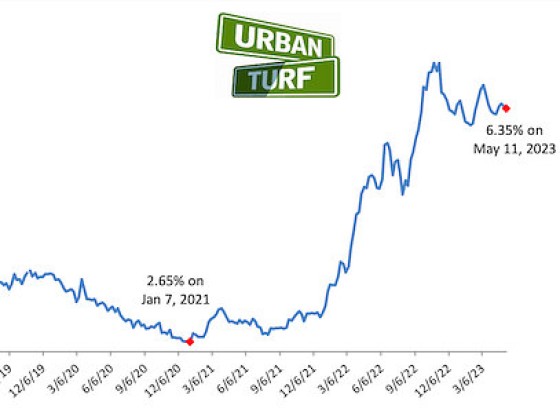What's Hot: The 4 Projects in the Works Near DC's Starburst Intersection | A 153-Room Aloft Hotel Pitched For Mt. Vernon Triangle
 New Lender Program Makes Borrowers' Offers More Competitive with Cash
New Lender Program Makes Borrowers' Offers More Competitive with Cash

Cash offers are often hard for many home buyers to compete with.
With a no-contingency offer (which many cash offers are), the home seller doesn’t need to worry that the transaction will fall through because of a contingency clause. There’s no uncertainty about whether a buyer may not secure final approval for a loan, or that the house will come in at an appraised value below the sales price. As a response to the prevalence of cash offers in many real estate markets, mortgage lenders are making an effort to allow borrowers to be more competitive through a process known as pre-underwriting, The New York Times reports. The article specifically cited the D.C. area — along with New York suburbs, the Boston area and northern and southern California — as a market where pre-underwriting is becoming more and more attractive.
Pre-underwriting is basically a more rigorous loan process, occurring prior to having an offer accepted, which guarantees a potential buyer will pay what they say they can pay. It eliminates the uncertainty present in run-of-the-mill offers, which are generally contingent on a buyer getting full approval of a loan. With pre-underwriting, applicants undergo a thorough process that involves all the paperwork they’d generally produce in the normal loan process. Once they’re approved, buyers can submit no-contingency offers knowing they’re in the clear for financing, just like a cash offer.
“At the end of the day, when you go to close, the seller doesn’t care where you get the money from as long as you have it,” said Peter Grabel, a loan originator at Luxury Mortgage Corporation, in an interview with UrbanTurf. “A lot of cash offers don’t really end up closing with cash.”
Instead, he explained, they are no-contingency offers made by buyers who know they can write a check in a pinch or are highly confident they’ll be approved for a loan. By contrast, a pre-approval letter “doesn’t really give a buyer confidence to go ahead,” Grabel said, because such letters are frequently secured without a close look at the buyer’s actual financial situation. Income, especially for more financially-complex buyers, doesn’t tell the whole story about what a buyer can afford to pay. Financed offers also generally come with certain contingencies. For example, in most lending scenarios, securing a mortgage is dependent on a home inspection and appraisal, because if a house ends up selling for more than its appraised value, a bank will only underwrite the loan up to the appraised amount.
For that reason, it’s a good idea to get an appraisal done prior to undergoing the loan process, in case the value comes in low, Grabel said, because pre-underwritten home loans are probably still contingent on an appraisal. For buyers able to afford putting a greater percentage of cash down on a home, it may not be a big deal for a house to come in higher than its appraised value. For buyers looking to put down the usual 20 percent, getting an appraisal done before signing a contract should be a priority.
Buyers interested in finding a bank to do pre-underwriting should look toward smaller lending shops, Grabel said.
“Big, national banks are not doing this because it’s a real different investment of time,” he explained. “I just did one today where I got the commitment but the borrower said, ‘Well, bad news. We’re not going forward with this one.’ That’s OK. The next house should be at a similar price point, and I’m hoping he sticks with us.”
This article originally published at https://dc.urbanturf.com/articles/blog/new_lender_program_puts_borrowers_on_level_with_cash/8268.
Most Popular... This Week • Last 30 Days • Ever

This week’s Best New Listings includes a cozy home adjacent to the Arboretum, a pr... read »

In this article, UrbanTurf looks at the estimated annual maintenance costs associated... read »

Another concept has been unveiled for one of DC's most contentious development sites,... read »

The big news in the development pipeline east of DC's H Street Corridor is the resur... read »

Renter demand has continued to push Class A apartment rents in the DC region up this ... read »
DC Real Estate Guides
Short guides to navigating the DC-area real estate market
We've collected all our helpful guides for buying, selling and renting in and around Washington, DC in one place. Start browsing below!
First-Timer Primers
Intro guides for first-time home buyers
Unique Spaces
Awesome and unusual real estate from across the DC Metro













